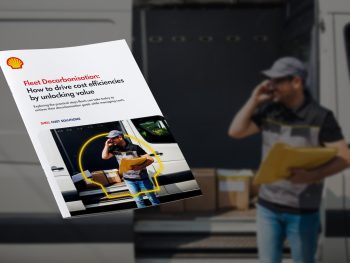Shell report outlines practical steps for cost-effective fleet decarbonisation
Shell Fleet Solutions has launched a new report exploring the impact of cost on fleet decarbonisation efforts and providing practical recommendations for the way forwards.

The report explores practical steps that fleets are taking to manage costs and unlock the value of low- and zero-carbon solutions
The new Fleet decarbonisation: How to drive cost efficiencies by unlocking value report is based on research amongst 742 businesses and fleet decision-makers across Europe, North America and Asia, which found that the cost of decarbonisation is perceived as the biggest challenge to fleets looking to achieve their sustainability goals.
Key findings include:
- Decarbonisation is not yet a priority: Only 1 in 5 (21%) of fleets surveyed have made a formal commitment to decarbonisation in their key performance indicators (KPIs). However, while the majority of fleets surveyed have not yet transitioned to EVs, higher EV adoption is expected in the future.
- Operational efficiency and total cost of ownership (TCO) remains key: Solutions to drive efficiency were listed as a top three desired benefit for the next 3-5 years among surveyed fleets. On top of this, reducing total cost of ownership (TCO) is the most highly desired benefit for delivery, operational and professional fleets.
In response, Shell Fleet Solutions has identified three practical steps mobility managers can take to address cost challenges when decarbonising their fleet:
- Understand the TCO of EVs versus internal combustion engine (ICE) vehicles in your fleet: By exploring factors beyond upfront costs (such as reduced refuelling and maintenance costs and increased uptime) fleets can better understand the economic impact electrification can have on their operations.
- Learn about the charging infrastructure you need to power your fleet: Fleets can look to get the most from their charging cycles by implementing an ecosystem of public and private charging solutions at depots, offices or homes. This can help to enhance convenience and reliability and create cost-effective charging schedules aligned with operational needs.
- Drive efficiency across your fleet no matter what powertrain you operate to reduce costs and emissions: Impact can be achieved by using telematics data – from utilisation to maintenance – to inform decision-making and help reduce the environmental impact of ICE vehicles. Fleets can also explore renewable diesel and alternative fuels to drive emissions reduction in the short term.
Giorgio Delpiano, senior vice president, Business Mobility, Shell, commented: “As fleets advance their decarbonisation journey, they need to balance the need to decarbonise with continuing to operate at low cost. Our latest report explores practical steps that fleets are taking to manage costs and unlock the value of low- and zero-carbon solutions.”
Shell Fleet Solutions is also supporting businesses through its Accelerate to Zero programme (A2Z). Aimed at fleets in all stages of the decarbonisation journey, the A2Z programme works with operators to build an integrated, evidence-based decarbonisation roadmap, tailored to their needs.
To access the full report and recommendations, please click here.
electric vehiclesfleet decarbonisationFleet electrificationshell











